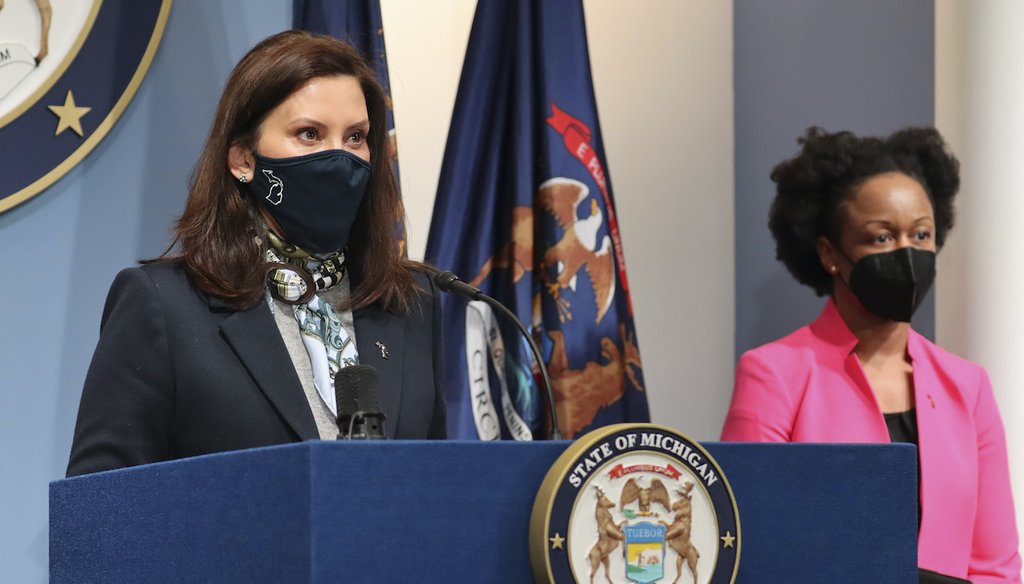Stand up for the facts!
Our only agenda is to publish the truth so you can be an informed participant in democracy.
We need your help.
I would like to contribute

Michigan Gov. Gretchen Whitmer, with state Chief Medical Officer Dr. Joneigh Khaldun, addresses the COVID-19 crisis, April 14, 2021, in Lansing (Office of the Governor via AP)
If Your Time is short
- Michigan Gov. Gretchen Whitmer said an October 2020 court ruling limited her powers to deal with a current surge in COVID-19 cases.
- But the state issued tough health restrictions after that ruling, and Whitmer has voluntarily relaxed restrictions in the past few months, even as cases stated rising again and new virus variants gained strength.
- Whitmer has resisted calls from federal health officials to impose new restrictions, and called for accelerating vaccinations.
Michigan Gov. Gretchen Whitmer said the recent surge in coronavirus cases that has made Michigan a national outlier is partly the result of a state Supreme Court ruling that struck down a key law she has used to fight the pandemic.
Her comments on NBC’s "Meet the Press" on April 18 were a departure from statements she made immediately following the October ruling, when she said she mostly retained powers related to public health measures but would require legislative approval for other measures, such as extending unemployment insurance benefits and allowing local governments to hold their public meetings remotely.
"I have been sued by my Legislature, I have lost in a Republican-controlled (Michigan) Supreme Court, and I don't have all of the exact same tools," Whitmer said after host Chuck Todd played clips of her previous statements and suggested she has changed her tune about following the science to address the pandemic.
WATCH: Michigan Gov. Gretchen Whitmer says she's "working with a smaller set of tools" in battling Covid.@GovWhitmer: "I have been sued by my legislature, I have lost in a Republican-controlled Supreme Court. And I don't have all of the exact same tools" as before. pic.twitter.com/EAH1ZZPbmm
— Meet the Press (@MeetThePress) April 18, 2021
Whitmer said in the interview that Michigan still has "strong measures to keep people safe," including a face mask requirement, and is "still doing what we can." She also cited Michigan’s success early on in the pandemic, when she imposed strict measures on business and other activities. Those moves, she said, said resulted in "vast reservoirs of people who don't have antibodies" and who are susceptible to highly contagious variants now circulating.
Immediately before Whitmer appeared on the Sunday show, Todd interviewed Dr. Anthony Fauci, director of the National Institute of Allergy and Infectious Diseases, who said the Biden administration was not surging more vaccines to Michigan, as Whitmer has requested, because when a state is in the middle of a surge, as Michigan, is, "the best thing to do is try to contain it," and "really to shut down things much more so."
Officials with the Centers for Disease Control and Prevention have made similar statements, urging Whitmer to impose additional restrictions to deal with the current surge.
In resisting those calls, Whitmer had mostly cited her strategy of accelerating vaccination, and urging — but not in all cases ordering — people to wear masks, observe social distancing, and take other measures to prevent virus spread. Under a Whitmer directive, all Michigan residents 16 and up are eligible to be vaccinated, as of April 5.
Before Sunday, Whitmer pointed not to a lack of the necessary powers, but to fatigue among Michigan residents with her use of those powers and concerns about compliance. And she has eased restrictions in Michigan in recent months — voluntarily, not in response to court rulings — despite rising case numbers and concerns about coronavirus variants that are not only more contagious but in some cases more deadly.
On Sunday, she said: "I am working with a smaller amount of tools at my disposal."
Asked by Todd whether that means she would do more if she had the power, Whitmer said: "At the end of the day, this is going to come down to whether or not everyone does their part."
In early October, the Michigan Supreme Court, which had a Republican majority then, struck down as unconstitutional the Emergency Powers of Governor Act of 1945, following a lawsuit brought by the GOP-controlled Legislature.
At the time, the 1945 law was the main tool Whitmer used to issue emergency orders to address the pandemic. At the time of the court ruling, Whitmer said that without the law she generally retained powers related to public health measures but would now need approval of the Legislature for other measures, such as extending unemployment insurance benefits and allowing local governments to hold their public meetings remotely.
Her administration immediately issued new orders under the Public Health Code — a separate state law unaffected by the court ruling — which replicated mask requirements, restrictions on gathering sizes and restaurant capacity, which were among the main features of the controls in place at that time.
"I will continue to use every tool at my disposal to protect the people of Michigan from the spread of COVID-19," Whitmer said Oct. 22, after the court’s ruling.
In November, with case numbers rising in Michigan and around the country, Whitmer used those powers to impose a temporary ban on indoor dining, indoor contact sports, in-person high school classes and any operations at venues such as movie theaters or bowling alleys. Whitmer later said those restrictions saved lives.
In mid-January, Whitmer said indoor fitness classes and non-contact sports could resume, and on Jan. 22, she allowed indoor dining to resume Feb. 1, at 25% capacity and with a 10 p.m. curfew.
And in early February, after it was known that the highly contagious variants were circulating in Michigan, but with case numbers declining for close to one month, Whitmer lifted the moratorium on indoor contact sports, amid pressure from Republicans and advocates for high school sports. Despite strict testing requirements, those sports have since been linked to many outbreaks.
In early March, Whitmer further eased indoor dining restrictions, and allowed increased traffic at retail stores and larger private gatherings. That order came despite a recent increase in Michigan’s weekly case numbers and growing concerns about highly contagious variants.
Michigan’s strategy of vaccinating its way out of the surge received a major setback April 13, when the CDC and the U.S. Food and Drug Administration recommended a pause in the use of Johnson & Johnson’s single-dose vaccine. There are signs that the announced pause has also lowered confidence in vaccination more broadly.
State Senate Majority Leader Mike Shirkey, and state House Speaker Jason Wentworth, who were highly critical of Whitmer's early attempts to control the virus, have both praised the governor's decision to hold off on new restrictions during the surge.
Our Sources
Tweet, Meet the Press, April 18, 2021
Detroit Free Press, Michigan Supreme Court strikes down Gov. Whitmer's emergency orders, effective immediately, Oct. 12, 2020
Detroit Free Press, Michigan was warned about British COVID-19 variant, but many ignored it, April 18, 2021
Detroit Free Press, Michigan restaurants can reopen indoor dining with limited capacity, curfew on Feb. 1, Jan. 22, 2021
Detroit Free Press, Gov. Whitmer lifts ban on Michigan indoor contact sports, starting Monday, Feb. 4, 2021.














